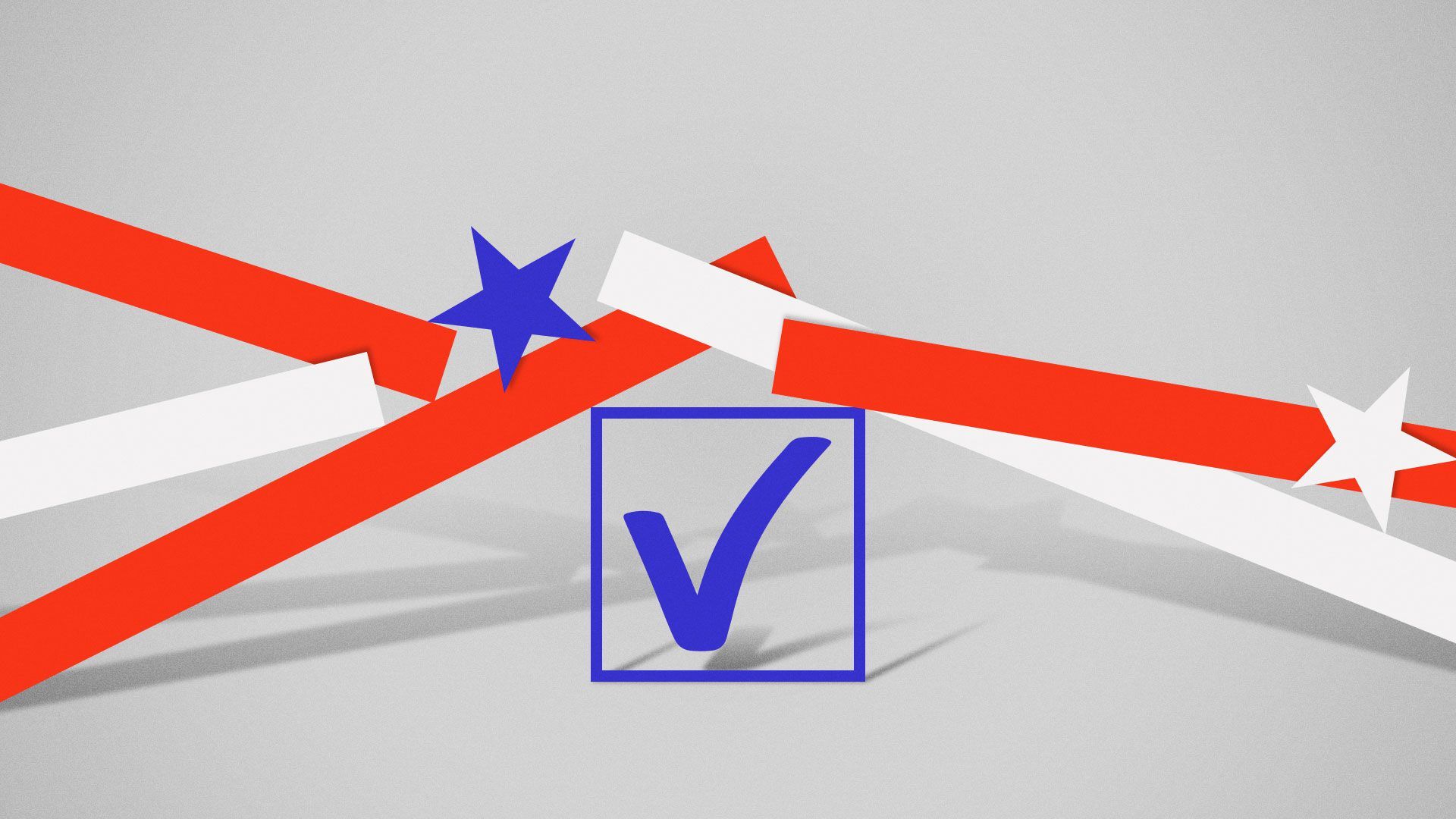An election like no other
Add Axios as your preferred source to
see more of our stories on Google.

Illustration: Eniola Odetunde/Axios
The coronavirus will make the 2020 presidential election different from any in modern history: Voting that begins earlier, results that take longer, mail carriers as virtual poll workers and October Surprises that pop in September.
The big picture: Perhaps 80 million Americans will vote early, by mail or in person, Tom Bonier, CEO of TargetSmart, a Democratic political data firm, tells Axios. That's going to set up more of an Election Season than an Election Day — and increase the odds of national turmoil over the vote count.
- The more than 40 million who did so in the 2016 general election could double this year, he says.
- 60% of respondents in a May survey for TargetSmart said they plan to vote early.
- "We may have a majority of Americans voting in a way that they have never voted before," Lawrence Norden, director of the Brennan Center’s election reform program, tells Axios.
Driving the news: Early voting options begin in just six weeks in some states, including Virginia, Minnesota and South Dakota, according to RepresentUs and Vote.org.
- In addition, Texas and Massachusetts have extended their timeframes for in-person, early voting, both starting in October.
- Meanwhile, in a preview of the potential demand for absentee alternatives, 24 states and Washington, D.C. had half or more of their ballots cast as absentee ballots in already-held statewide elections during the pandemic.
- That's a dramatic increase from 2016 for most, per FiveThirtyEight. And there could be higher turnout for the general election.
Ahead of massive demand for mailed ballots, the U.S. Postal Service already is dealing with days-long backlogs caused by new "cost-cutting" measures.
- Those backlogs prevented some voters from getting absentee ballots for Michigan's Tuesday primaries, as the Washington Post reported. And millions of voters could depend on the Postal Service to deliver their ballots on time in November.
- There's also a greater risk of mailed-in votes getting thrown out because of mistakes, compared to in-person ballots. More than 100,000 mailed ballots cast in the March presidential primary were rejected in California.
- Experts are already warning that final election results could be delayed for weeks.
"We talk about the election being three months away, but really voting is going to start in a month and a half."— Lawrence Norden, Brennan Center
The old-school notion of an "October Surprise" will morph or see its power diminish.
- "When you assume a week before Election Day that maybe half of the votes that will be cast have already been cast, well then your ability to impact the electorate is limited," said Bonier of TargetSmart.
- Everything that happens between mid-September and Election Day, however, will matter more.
Longer lines: Voters who wait for the last day will likely face longer lines than usual in some places due to consolidation of polling places, shortages of poll workers who tend to be elderly and therefore at risk of the coronavirus — as well as high turnout.
- "Some traditional polling sites won’t be usable, such as senior centers, perhaps schools" because of the virus, said NYU's Richard Pildes, a specialist in legal issues concerning democracy.
- Still, issues with or distrust of absentee ballots could also force more voters to polling centers on Election Day, according to Richard Hasen, an election law expert at the University of California, Irvine.
Late results: With the increase of absentee voting, counting results will take longer. Outcomes could seemingly shift after election night once more absentee ballots are counted.
- If the presidential election takes longer than a night to determine, Norden says, "there could be Senate races where it goes on much longer than that."
- Nearly six weeks after election day there were still two undecided congressional primary races in New York City.
Challenged outcomes: Trump has already made accusations of voter fraud, and has been railing against vote-by-mail. Close races and delayed results would fuel those accusations — and lawsuits.
Misinformation and disinformation: Don't forget the 2016 Russian disinformation crisis. "It remains and is worse than in 2016. Intelligence officials have publicly warned of not just increased efforts by Russia, but other countries, China and Iran," says NYU's Pildes.
David Nather contributed to this story.

